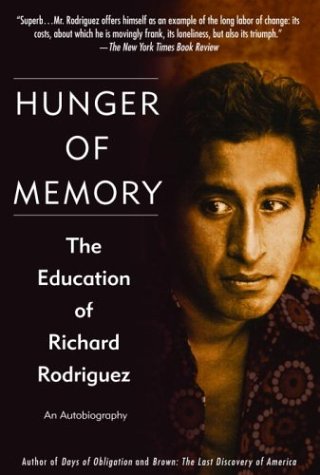All Nonfiction
- Bullying
- Books
- Academic
- Author Interviews
- Celebrity interviews
- College Articles
- College Essays
- Educator of the Year
- Heroes
- Interviews
- Memoir
- Personal Experience
- Sports
- Travel & Culture
All Opinions
- Bullying
- Current Events / Politics
- Discrimination
- Drugs / Alcohol / Smoking
- Entertainment / Celebrities
- Environment
- Love / Relationships
- Movies / Music / TV
- Pop Culture / Trends
- School / College
- Social Issues / Civics
- Spirituality / Religion
- Sports / Hobbies
All Hot Topics
- Bullying
- Community Service
- Environment
- Health
- Letters to the Editor
- Pride & Prejudice
- What Matters
- Back
Summer Guide
- Program Links
- Program Reviews
- Back
College Guide
- College Links
- College Reviews
- College Essays
- College Articles
- Back
Hunger of Memory by Richard Rodriguez MAG
When I began Hunger of Memory, I was apprehensive about Rodriguez's style, and at first, I felt as though I were learning to read all over again. I remember turning to the first page and daring myself to dislike it. I couldn't imagine reading the entire autobiography under such circumstances.
I glanced at the page. A massive army of short sentences and bold periods glared back. As someone who enjoys the lengthy flow of paragraph-long phrases strung together like rows of tiny Christmas lights with an abundance of commas, semicolons, and hyphens, this style was intimidating. Struggling to grasp its flow, I read aloud. My voice jerked like a car running over a series of speed bumps. As soon as I began to follow, I was stopped by an abrupt period.
After a while, my eyes stopped searching for startling punctuation and misplaced modifiers, my mind switched out of its editing mode, and I began to relax and enjoy Rodriguez's message. My mind sank into the rhythm of his words. I listened to myself repeat one of his sentences. I realized the effect his style created: it emphasized his voice.
Instead of relaxing and enjoying what the author has to say, I'm constantly analyzing the sentence structure of A Bronze Bow, or studying the grammar in Little Women. But in all of my searching and analyzing, I tend to overlook the most important and engaging characteristic in a book: its voice. Rodriguez's style emphasizes his voice, strengthens the content of his message, and instills key points in readers' minds. Instead of allowing his voice to be defined by his sentence structure and grammar, he defines it by his voice.
Similar Articles
JOIN THE DISCUSSION
This article has 0 comments.

